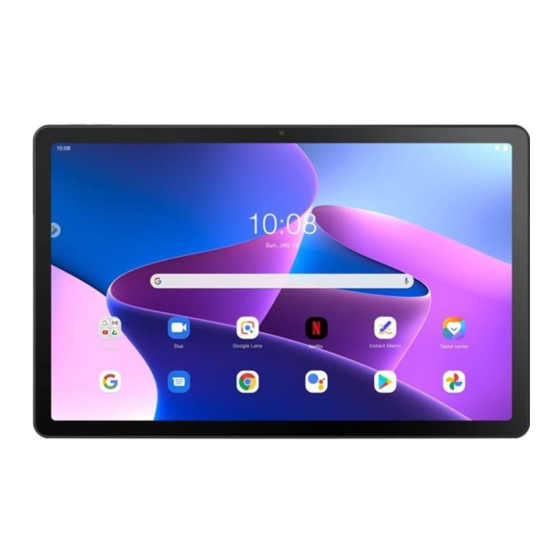Lenovo Tab M10 Plus 3rd Gen TB125FU Руководство пользователя - Страница 21
Просмотреть онлайн или скачать pdf Руководство пользователя для Планшет Lenovo Tab M10 Plus 3rd Gen TB125FU. Lenovo Tab M10 Plus 3rd Gen TB125FU 25 страниц.

RSS standard(s). Operation is subject to the following two conditions:
(1) This device may not cause interference, and
(2) this device must accept any interference, including interference that may cause undesired
operation of the device.
Le présent appareil est conforme aux CNR d'Industrie Canada applicables aux appareils radio
exempts de licence. L'exploitation est autorisée aux deux conditions suivantes:
(1) l'appareil ne doit pas produire de brouillage, et
(2) l'utilisateur de l'appareil doit accepter tout brouillage radioélectrique subi, même si le brouillage
est susceptible d'en compromettre le fonctionnement.
Japanese VCCI Class B statement
この装置は、クラス B 情報 技 術装置です。この装置は、家庭環 境 で使用することを目的としていますが、この
装置がラジオやテレビジョン受信 機 に近接して使用されると、受信障害を引き 起 こすことがあります。 取扱
説明書に従って正しい取り扱いをして下さい。VCCI-B
Japan compliance statement for products that connect to power mains rated at less than or equal to
20A per phase
日本の定格電流が 20A/相 以下の機器に対する高調波電流規制
高 調波電流 規 格 JIS C 61000-3-2 適合品
Environmental, recycling, and disposal information
General recycling statement
Lenovo encourages owners of information technology (IT) equipment to responsibly recycle their
equipment when it is no longer needed. Lenovo offers a variety of programs and services to assist
equipment owners in recycling their IT products. For information on recycling Lenovo products, go to
http://www.lenovo.com/recycling.
Important battery and WEEE information
Take back and recycling information for WEEE and batteries/accumulators in the European Union and
the United Kingdom
The crossed-out wheeled bin marking applies only to countries with WEEE and batteries waste
regulations within the European Union (EU), and United Kingdom (UK).
Appliances and batteries/accumulators are labeled in accordance with local regulations concerning
waste electrical and electronic equipment (WEEE) and waste batteries and waste accumulators. These
regulations determine the framework for the return and recycling of used appliances and used
batteries/accumulators as applicable within each geography. This label is applied to various products
to indicate that the product is not to be thrown away, but rather put in the established collection
systems for reclaiming these end of life products.
The label on the battery may also include a chemical symbol for the metal concerned in the battery
(Pb for lead, Hg for mercury, and Cd for cadmium).
Users of electrical and electronic equipment (EEE) and users of batteries/accumulators with the
crossed-out wheeled bin marking must not dispose of end of life products as unsorted municipal
waste, but use the collection framework available to them for the return, recycle, and recovery of
WEEE and waste batteries/accumulators and to minimize any potential effects of EEE and batteries on
the environment and human health due to the presence of hazardous substances.
Lenovo electrical and electronic equipment (EEE) may contain parts and components, which at end-of-
life might qualify as hazardous waste.
